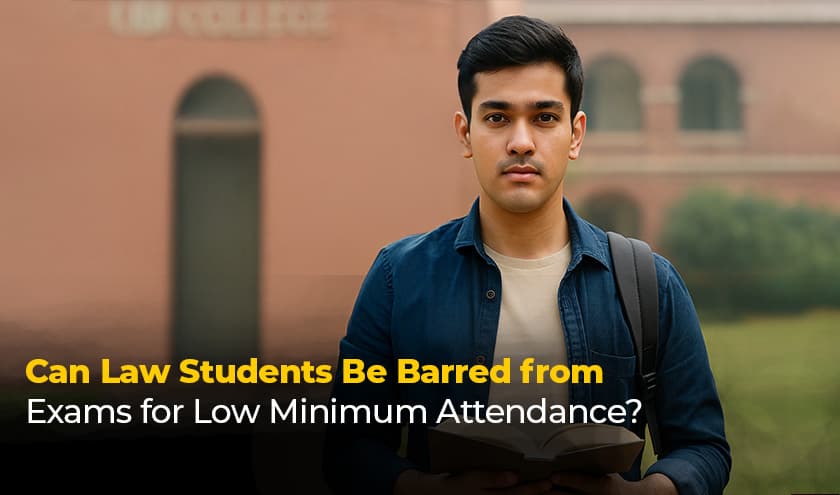Can Law Students Be Barred from Exams for Low Minimum Attendance?

Imagine dedicating years to law school, attending most classes, completing internships, and suddenly being told you cannot sit for exams due to missing a few lectures. Stressful, isn’t it? Fortunately, recent court rulings in India clarify that law students cannot be barred from exams solely for low attendance. With proper legal guidance—whether through a lawyer in India or legal advice online—students can understand their rights and ensure fair treatment.
Introduction
If you’re a law student, parent, or law college administrator, this blog explains the important legal question: can a law student be debarred from exams due to low attendance? You’ll learn about Bar Council of India regulations, recent Delhi High Court guidance, and practical steps you can take. At VakeelSaab, our legal consultation services—available both in person and as legal advice online—help you navigate these rules effectively and protect your rights.
Background/Context: Understanding the Legal Framework
Bar Council of India (BCI) Rules
The BCI sets minimum standards for legal education in India, including attendance requirements. Some universities enforce up to 70% attendance for eligibility. However, attendance policies must not contradict BCI regulations.
Recent Delhi High Court Ruling
In 2025, the Delhi High Court clarified that no law student can be barred from appearing for exams solely due to attendance shortfall. Key points:
- Colleges cannot deny exam eligibility if attendance falls below their internal target but meets BCI minimum standards.
- Institutions must provide weekly attendance updates and allow remedial classes for students with attendance deficiencies.
Why This Matters
If your college attempts to debar you for attendance issues, knowing your rights and seeking a lawyer in India for legal consultation or legal advice online can prevent unnecessary academic setbacks.
Key Issues: Misconceptions and Challenges
Automatic Exam Debarment
Many colleges automatically block students with low attendance from exams. This can disrupt academic progression.
Misconception: Attendance Rules Are Absolute
Institutions cannot bar students without considering mitigating factors. Attendance shortfall alone is not enough to deny exam participation under current law.
Excessive Attendance Norms
Some colleges impose stricter attendance requirements than BCI standards. The Delhi High Court has emphasized that these should not be used to deny exam eligibility.
Mental Health and Career Impact
Strict, inflexible attendance policies can cause stress, mental trauma, and affect future legal careers. Seeking legal consultation can help students assert their rights and reduce anxiety.
Practical Guidance: Steps Students Should Take
Step 1: Verify College Policy
Understand your institution’s attendance rules and check if they allow condonation or exemptions.
Step 2: Document Your Attendance
Keep records such as:
- Attendance sheets
- Emails and approvals for internships, moot courts, or legal aid work
- Medical certificates
Step 3: Seek Legal Consultation Early
If your college threatens debarment:
- Contact a lawyer in India for guidance.
- Get legal advice online if in-person consultation is not feasible.
- A professional can draft representations or review policies against BCI norms.
Step 4: Submit a Representation
Include:
- Reference to the Delhi High Court ruling
- Evidence of valid absences
- Request for condonation or alternate assessment
Step 5: Escalation if Needed
If the institution still refuses, escalate to the grievance committee, university, or file a writ petition with legal guidance.
Case Studies and Examples
Landmark Case
A law student at Amity Law School (Delhi-NCR) was debarred for attendance and tragically passed away. This led to legal scrutiny and the Delhi High Court’s directive preventing exam barment solely due to attendance.
Hypothetical Scenario
Priya missed several lectures due to an approved internship but had 65% attendance. Initially barred, she sought legal advice online from a lawyer in India, who helped submit a representation citing the Delhi High Court ruling. The college allowed her to appear for exams, preserving her academic progress.
Best Practices: Expert Recommendations
- Don’t assume automatic barment for low attendance.
- Document all absences and mitigating circumstances.
- Seek early lawyer consultation or legal advice online.
- Participate in extracurricular law activities for credit where applicable.
- Colleges should align policies with BCI norms and court directives.
Call-to-Action
If you or your child face exam eligibility issues due to attendance, VakeelSaab can help. Our lawyer in India and online team offer trusted legal consultation and legal advice online to protect your academic rights. Book a Consultation Now to ensure your exams and career are secure.
Frequently Asked Questions (FAQ)
1. Can a law student be barred from exams for low attendance?
No. Attendance alone cannot bar law students from exams as per Delhi High Court guidelines.
2. What to do if my college blocks me from exams?
Document your attendance and seek a lawyer in India for legal consultation or legal advice online.
3. Do internships or moot courts count toward attendance?
Yes, approved internships and moot court work may count—check your college policy.
4. Can I get legal advice online instead of in-person consultation?
Absolutely. Many lawyers in India offer reliable legal advice online.
5. How can a lawyer in India help with attendance issues?
They can review policies, draft representations, guide grievance redressal, and provide legal consultation to protect exam eligibility.
Related Articles
The Importance of Consulting a Property Lawyer for Real Estate Issues
Blog
How to File a POCSO Complaint in India: Step-by-Step Legal Process
Blog
What punishments does the law give for giving, taking, or asking for dowry?
Blog
Reasons for the Increasing Divorce Rates in India
Blog
What is a Special Leave Petition? Meaning, Features, Process & & Who Can File?
Blog
What Is the Difference Between Mutual Divorce and Contested Divorce?
Blog